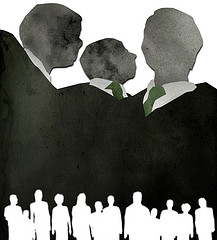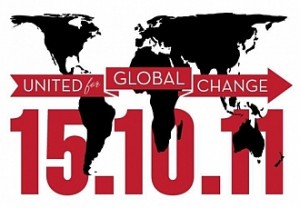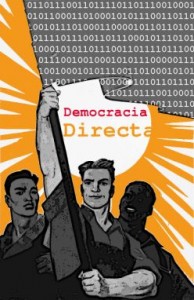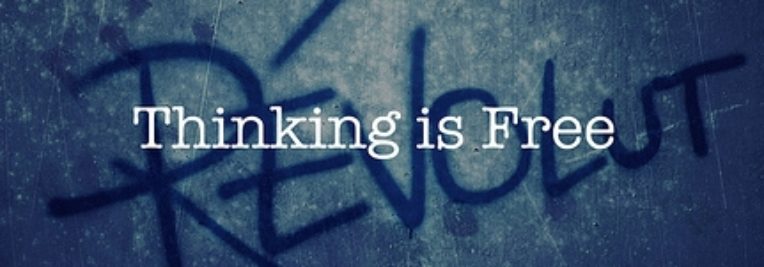Image above by Polvere di Gesso (CC, Flickr)
The world as we know it is in transition. Institutionalised power strengthens its hold on our lives, but can now be subverted with a few keystrokes. Protests occur simultaneously around the globe, we have more access to information than at any point in history, and the skills needed to communicate across vast distances are learned before we can even ride a bike.
More than ever before, we each have a voice and can choose how to use it. We can promote our own wares, make sure a complaint is dealt with quickly, share ideas and creative output, highlight social injustice, even band together to overthrow oppressive regimes and undermine dominant institutions.
The modern globalised world – and digital technology in particular – has provided us with a revolutionary capacity to be heard and instigate change. Rapidly shifting the world around us, the manner in which we can express ourselves and effectively champion different needs is opening up new areas of interpersonal and civic engagement. What we choose to do with these new spheres of communication and organisation varies from enlightening to devastating, providing further insight into the human condition and our symbiotic relationship to the social reality we construct. The picture that develops is sometimes terrifying, but more often astonishing in its ability to adapt to changing circumstances and overcome adversity in innovative ways. We have a voice!
This voice finds expression not only via the internet, but also through dynamic forms of community and political mobilisation that have been enabled, encouraged, and made resurgent within an increasingly globalised context. To pick one example, in March 2016 an Arizona House Committee meeting was shut down because of protests about voter disenfranchisement and election fraud in the US election primary. Chants of ‘the whole world is watching!’ rang out around the room. Dozens of people broadcast the reality of what was occurring in that room live for thousands of viewers around the world to see. The discontent was communicated to a global audience immediately and freely documented for others to engage with directly. This is just a small example of the new voice that we now have access to, chosen because the chant perfectly describes why the context of the last few years is fundamentally changing the nature of civic engagement and political dialogue. We have always had a voice. The difference now is that the whole world is watching and can listen to what we have to say.
What we are witnessing today are new foundations for personal and collective voices to be heard regardless of background, wealth or status. Whether you look at examples such as Occupy Wall Street and Black Lives Matter in the US; the direct democracy surge in Iceland; the push for digital rights by the UK’s Leader of the Opposition; efforts to protect internet freedom at the Decentralised Web Summit; the sustainability revolution taking place in Costa Rica; the popular uprising in Guatemala; open-source software and engineering movements; the circular economy clusters in Ghana; or the matriarchal villages blossoming in Kenya – to name just a few. A wave of social liberation and community innovation is emerging and being shared around the world, inspiring others towards new forms of co-creation and egalitarian endeavours that work to overcome the injustices that surround us.
 We are all finding our voice and beginning to use it on a massive scale to transcend and subvert traditional power structures. Unfortunately this means that there are those who – as always – seek to control this voice and harness its energy and creative capacity. If not censor it entirely, then manipulate our worldview in such a way that we often find that we are unknowingly working against our own best interests.
We are all finding our voice and beginning to use it on a massive scale to transcend and subvert traditional power structures. Unfortunately this means that there are those who – as always – seek to control this voice and harness its energy and creative capacity. If not censor it entirely, then manipulate our worldview in such a way that we often find that we are unknowingly working against our own best interests.
Examples of 21st century propaganda within modern democracies that are blatantly displayed with the likes of Correct the Record and the workings of the so-called Alt-Right in this US election cycle show just how brazen these efforts have become, all while the capture of major media narratives and the collusion between political and media power structures has come to light (continuing almost exactly along the lines of Chomsky and Herman’s excellent analysis in their book Manufacturing Consent). Yet, even looking through such fog of disinformation, efforts to malign progressive campaigns and marginalise voices of protest have been shown to be increasingly ineffective and often prove to backfire spectacularly as they are quickly identified, shared and called out for the attempted manipulation.
Of course, it is also true that the ability to be heard and the capacity to mobilise large groups of people can be used for negative, at times violent and destructive purposes. In many other respects, this complex and rapidly evolving sphere of human activity is so fundamental to the emerging social realities of the world today that it can be difficult to analyse small segments of their influence in isolation from the larger picture. But with a greater capacity for expressing ourselves we have the opportunity to discover more effective avenues for change, whilst at the same time learning how to overcome attempts to frame political narratives into neatly packaged containers that work towards maintaining the status quo. Having a voice emerges most powerfully for the marginalised or disenfranchised, but it develops quickly into new forms of political and socioeconomic engagement for all of us.
This is ultimately about a journey towards more inclusive, transparent and co-operative societies that seek to uplift citizens rather than exploit them. The trajectory of recent citizen-led uprisings and protests around the world shows that the spotlight on power continues to shine brighter and more illuminating than ever before. With a focus on the power structures that seek to control society – and a global debate about whether or not they should continue to be allowed to do so – we are entering into new areas of understanding on the role of sovereignty, citizenship and the creative capacity to overcome deep-seated problems that have blighted the landscape of human history.
The development of alternate forms of social construction and the inclusion of a wide variety of perspectives into local, national and global decision-making will prove vital to ensuring a positive future for as many people as possible. This is difficult to achieve in practice and there is a tendency towards dismissing the more complicated – and sometimes chaotic – paths forward for the comfort of ‘business as usual’ and the maintenance of the status quo that many profit greatly from. However, if we start to collect together the various campaigns, initiatives, movements and alternatives that are picking up momentum (even if many of them will, individually, not prove to be successful) a different picture emerges that shows us the status quo continuously challenged amid growing attempts to re-envisage society at a fundamental level.
This landscape of progressive politics and new economics is an excitingly vibrant one. New forms of activity in these spheres can emerge from anywhere and do not require the approval of established channels of power to be created, trialled and implemented. They gain purchase through people’s commitment and energy for them and are proven by their ability to have a positive transformative effect. They forge a space between the dichotomy of reform and revolution as part of a transitional moment that allows innovative ideas to emerge at greater speed and comprehension than ever before.
 Personally, this became viscerally real in 2011 with the United for Global Change call-to-action (of which today marks the fifth anniversary) that followed the lead of the Indignados, Ad Busters and Occupy Wall Street. The financial crisis of 2007/08 – and the ongoing economic calamity around the world ever since – created the impetus for entire generations to become increasingly politically active and vocal on the injustices that they saw or were suffering from. Gross imbalances of power and political capture are now clearly seen and readily articulated. What is fascinating to watch develop, and in some small way participate in, are the wide range of attempts to formulate new structures and modes of collective being that provide political and economic liberation. Many of these are focused on local communities and the renewal of interpersonal relationships; others are made effective because of the ability to multiply the efforts of individuals into results of global significance.
Personally, this became viscerally real in 2011 with the United for Global Change call-to-action (of which today marks the fifth anniversary) that followed the lead of the Indignados, Ad Busters and Occupy Wall Street. The financial crisis of 2007/08 – and the ongoing economic calamity around the world ever since – created the impetus for entire generations to become increasingly politically active and vocal on the injustices that they saw or were suffering from. Gross imbalances of power and political capture are now clearly seen and readily articulated. What is fascinating to watch develop, and in some small way participate in, are the wide range of attempts to formulate new structures and modes of collective being that provide political and economic liberation. Many of these are focused on local communities and the renewal of interpersonal relationships; others are made effective because of the ability to multiply the efforts of individuals into results of global significance.
Rediscovering citizenship through these kinds of community building, direct action and accountability mechanisms is rapidly shifting accepted notions of what society can be. One of the greatest successes of the Occupy movement globally was to push the issue of inequality – both within countries and between them – firmly back into the political spotlight. By doing so, government policy decisions, the commercial activities of the private sector, and the inefficiencies of some non-profit organisations are scrutinised in new and often far less forgiving ways. The sense of public outrage at structural injustices and imbalances of power are more difficult than ever to ignore or whitewash – even as the stubborn pillars of an increasingly less ‘mainstream’ media continue to do their absolute best to try and maintain a hold on our social narratives.
One of the key difficulties at the moment is to ensure that those perspectives that centre upon human dignity and the flourishing of our shared ecosystem are given the power to overcome some of the more negative tendencies that we have seen ample display of throughout history. How do we encourage a more democratic approach to financial regulation and economic policy, currently overrun by vested interests and powerful lobby groups? Do our local and national politicians represent the views of their constituents, or are they more concerned with re-election and the soundbites required during short election cycles? What power does the average citizen have to effect social change, and is that access growing or diminishing?
 During a period of increasing economic uncertainty and marginalisation, with growing citizen disaffection and resulting civil unrest, there is an opportunity to more directly impact large-scale processes of social formation. This opportunity has been greatly enhanced by our ability to speak up and share our views, to find and collaborate with like-minded people, and to challenge publicly what were previously unapproachable (and in many cases invisible) structures of power and control.
During a period of increasing economic uncertainty and marginalisation, with growing citizen disaffection and resulting civil unrest, there is an opportunity to more directly impact large-scale processes of social formation. This opportunity has been greatly enhanced by our ability to speak up and share our views, to find and collaborate with like-minded people, and to challenge publicly what were previously unapproachable (and in many cases invisible) structures of power and control.
Lest you think that I have fallen into an overly glossy and perhaps naive view of the world, let’s be clear – the reason these opportunities are so important is because we are eroding the foundations of humanity underneath narratives of conflict, aversion to difference, economic and regulatory capture and ideological tyranny linked closely to vested corporate interests. All while turning a blind eye to the injustices caused and the devastation to our planet and global society alike. We have the capability and the capacity to overcome these challenges, but we are still in the formation stages of trying to figure out productive processes and an inclusively flexible approach that can react to a wide variety of difficulties along the way and end up stronger for doing so.
I truly believe that newly emergent processes are more important than the iteration of fixed systems. We no longer need the approval of editors, producers, supervisors or other kinds of gatekeepers to express ourselves and have our voice heard. Only by many of us sharing our views, and building upon the imagination and insights of those we come into contact with (whether virtually or physically), can we begin to construct the kinds of viable alternatives that are needed to successfully navigate the shifting landscapes of the 21st century.





